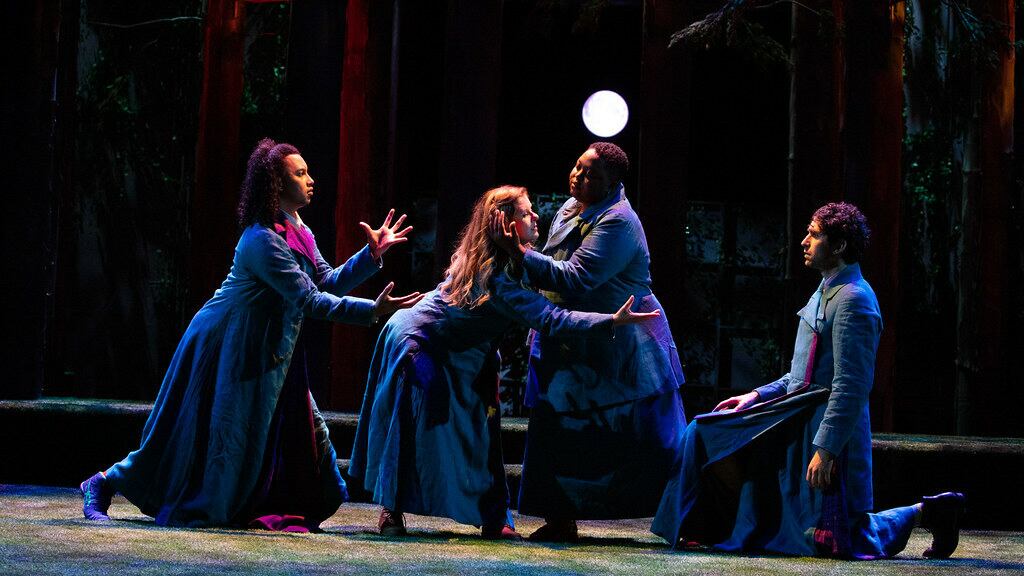This summer, London’s Globe theater is presenting A Midsummer Night’s Dream with a controversial warning about the play’s “language of misogyny and racism.”
The advisory has a point. Shakespeare’s 400-year-old masterpiece of comic romance is cringey in places, especially when a daughter is required to obey her father or die and another character makes a crack about the daughter’s dark coloring, saying, “Away, you Ethiop.”
Portland Center Stage’s production of the play, as directed by Marissa Wolf, requires no such warning, though. Instead, the company nimbly makes merry with the offensive bits by employing a delightfully diverse cast.
In Shakespeare’s script, the male Duke Theseus can make modern audiences squirm as he lasciviously licks his chops over winning his Amazon bride, Hippolyta, in battle. In Wolf’s production, Theseus’ pronouns are still he/him, but he’s played by the female actor and drag king Jennifer Lanier. And his war prize (Lauren Bloom Hanover) glares at the duke in a way that tells us she can take care of herself.
Like Shakespeare’s poetic lines themselves, the performers in this fresh, inclusive show—binary and cis, LGBTQ and straight, persons of color and white—work together to weave a magic that transcends the script’s 16th century prejudices…and today’s.
The play begins in Athens, where the awful father of Hermia (Nicole Marie Green) is wielding his patriarchal power by ordering her to marry Demetrius (Jesse Weil)—no matter that she loves another man, Lysander (Treasure Lunan). Lysander and Hermia escape into the woods, followed by the spurned Demetrius and Helena (Tyler Andrew Jones), the woman who loves him.
Also in the forest are a warring fairy king and queen, the fairy servant Puck (Ken Yoshikawa), and some goofy artisans who are rehearsing a play. When the fairies anoint first Lysander and then Demetrius with a potion that makes them both fall in love with Helena, mayhem ensues.
For over two hours, the play serves a giddy brew of comic confusion as actors, playing multiple roles, stumble, whoosh, and twinkle through a forest of magically moonlit trees. One moment Green is the spitfire Hermia and the next she’s the trembling worker and amateur actor who portrays the reluctant lion in the play within the play. Also of note is Andrés Alcalá, who portrays Hermia’s blustering father in a gray suit and then embodies a comic sweetness as one of the fairy queen’s attendants, dressed in pink polka-dotted jeans and wafting his arms as if they were being lifted by a warm breeze.
Sarita Fellows’ clever costume designs facilitate the constant quick changes, allowing actors to exit as one character and return as another in a breath. The costumes also help the audience keep track of who’s who in the midst of the chaos, with the main Athenian characters wearing long robes they can easily doff to transform into fairies or “rude mechanicals.”
Jones is particularly hilarious as Helena—the “sweet lady”—who crosses her arms and stomps around the stage in a self-pitying huff. Likewise, Lunan, with a warm and elastic voice, turns Lysander’s love talk, including a simple “amen,” into humorous expressions of eroticism.
Movement, though, is the real star of Wolf’s production, which is often balletic. Yoshikawa’s aggressively mischievous Puck is constantly in motion, whether he’s skipping, leaping, or jabbing the air with a pointed finger. Similarly, Andy Perkins, as the endearing doofus Bottom, tiptoes, prances and struts with a congenial, outsized sense of confidence. Music helps keep all these comings and goings fluid, as an irresistible beat sweeps the madcap characters on and off the stage and chimes softly sound whenever someone is anointed with the love potion.
Once all the conflicts are resolved, everyone from the queen of the fairies to Bottom dances together in the forest. Unlike traditional stagings of Midsummer, each character enjoys a brief solo dance as the other characters cheer them on. It’s the best of both worlds, where diverse individuals can dance together and also be seen and celebrated for their differences. After years of increasing divisiveness and violence in our society—and the threat of more to come—this dream reawakens our communal longing for a green and joyful world.
SEE IT: A Midsummer Night’s Dream plays at Portland Center Stage at the Armory, 128 NW 11th Ave., 503-445-3700, boxoffice@pcs.org. 7:30 pm Wednesday-Saturday, 2 pm Thursday and Saturday, through July 2. $25-$93. 16+.
